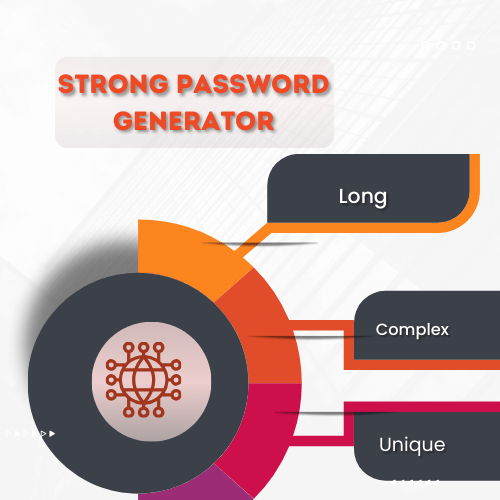
Free Password Generator
Say goodbye to password stress! Boost your online security with our friendly Password Generator at CleverTextKit. Create strong and memorable passwords that fit your style, making your digital life both secure and hassle-free.
What makes a password strong?
Long
A strong password should be at least 10 characters long.The longer a password, the more secure it is.
Complex
Strong passwords use a combination of letters, numbers, cases, and symbols to form an unpredictable string of characters that doesn't resemble words or names.
Unique
A strong password should be unique to each account to reduce vulnerability in the event of a hack.
Password Generator Tool FAQs
To safeguard your passwords against potential hacking methods like social engineering, brute force, or dictionary attacks, and to ensure the security of your online accounts, it's crucial to adhere to the following guidelines:
1- Avoid using identical passwords, security questions, and answers across multiple important accounts.
2- Employ passwords with a minimum of 16 characters, incorporating at least one number, one uppercase letter, one lowercase letter, and one special symbol.
3- Refrain from incorporating familial, friend, or pet names into your passwords. In cases where substantial assets are at stake, such as owning over 100 bitcoins, restrict password knowledge to trusted individuals, like your mother, even excluding your father's access.
4- Steer clear of including personal identifiers like postcodes, house numbers, phone numbers, birthdates, ID card numbers, or social security numbers in your passwords.
5- Eliminate dictionary words from your passwords. Strong password examples include: ePYHc~dS*)8$+V-', qzRtC{6rXN3N\RgL, zbfUMZPE6`FC%)sZ. Weak passwords to avoid include: qwert12345, Gbt3fC79ZmMEFUFJ, 1234567890, 987654321, nortonpassword.
6- Avoid using similar passwords with shared characters, such as "ilovefreshflowersMac" and "ilovefreshflowersDropBox," as compromising one password jeopardizes all related ones.
7- Do not employ easily replicable items like fingerprints as passwords, as they can be cloned.
8- Refrain from allowing web browsers (FireFox, Chrome, Safari, Opera, IE, Microsoft Edge) to store passwords, as browser-stored passwords are susceptible to easy retrieval.
9- Exercise caution when logging into crucial accounts on public or shared devices or through public Wi-Fi networks, Tor, free VPNs, or web proxies.
10- Transmit sensitive information exclusively via encrypted connections (e.g., HTTPS, SFTP, FTPS, SMTPS, IPSec) to prevent interception via unencrypted channels like HTTP or FTP.
11- While traveling, encrypt your internet connections before transmission, for example, by establishing a private VPN (e.g., WireGuard, IKEv2, OpenVPN, SSTP, L2TP over IPSec) or encrypted SSH tunnel between your device and a secure server.
12- Assess the strength of your passwords by converting them into MD5 hashes and checking for matches in popular rainbow tables. Periodically update passwords every 10 weeks.
13 - Remember a few master passwords and store others securely, encrypting them with tools like 7-Zip, GPG, or BitLocker.
14- Back up encrypted passwords in multiple locations to swiftly regain access if necessary.
15- Enable two-step authentication whenever possible and avoid storing critical passwords in cloud services.
16- Access important websites directly from bookmarks and verify website legitimacy before entering passwords, especially for financial sites like PayPal.
17- Safeguard your computer with firewall and antivirus software, and keep operating systems and web browsers updated for enhanced security.
18- Be vigilant for hardware and software keyloggers and hidden cameras, particularly on devices storing important files.
19 - Use on-screen keyboards when entering passwords on potentially compromised Wi-Fi networks and encrypt entire hard drives for added security.
20 -Access important websites in private browsing modes and segregate internet activities across different web browsers or virtual machines.
21- Utilize multiple email addresses, each designated for specific purposes, and avoid sharing phone numbers used for verification codes.
22- Refrain from clicking links in suspicious emails or messages and avoid sharing passwords via email.
23 - Exercise caution when downloading and updating software to mitigate supply-chain attacks, favoring web-based applications when possible.
24- Use caution with online paste and screen capture tools to prevent inadvertent exposure of passwords.
25- For webmasters, adopt secure password storage practices, utilizing hashed values and device verification mechanisms.
26- Implement secure domain registration and email hosting for business continuity, and prefer virtual credit cards for online transactions.
27- Always lock devices when unattended and encrypt system partitions to safeguard sensitive data.
28- Regularly check for and remove unreliable SSL certificates to maintain secure HTTPS connections.
29 Harden server defenses against brute force attacks with intrusion detection and prevention software.
30- Prefer cloud-based software to mitigate supply-chain attacks and verify file integrity regularly to detect unauthorized changes.
31- Employ Artificial Intelligence-based intrusion detection systems for enhanced security.
32- Restrict server access to whitelisted IP addresses and explore techniques for hiding files within others to enhance security.
These measures collectively reinforce online security and protect against various threats to personal and organizational data.
